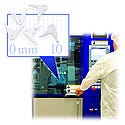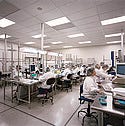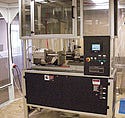September 9, 2009
Originally Published MPMN September 2009
SPOTLIGHT
Molding
Tight-tolerance molding services Specializing in tight-tolerance medical device molding, a company offers component and device manufacturing services using a variety of engineered and commodity resins. Equipped with 21 injection molding machines ranging from 35 to 400 tn and featuring robotic mechanization, the company can produce shot sizes ranging from 3 to 55 oz for part manufacturing. It can support concept development through its engineering and tooling center, as well as mold design, build, modification, and repair requirements using its in-house mold shop. Insert and overmolding, blow molding, and cleanroom manufacturing services are also offered. The company is equipped to provide ultrasonic welding, hot stamping, and packaging services as well.
Specializing in tight-tolerance medical device molding, a company offers component and device manufacturing services using a variety of engineered and commodity resins. Equipped with 21 injection molding machines ranging from 35 to 400 tn and featuring robotic mechanization, the company can produce shot sizes ranging from 3 to 55 oz for part manufacturing. It can support concept development through its engineering and tooling center, as well as mold design, build, modification, and repair requirements using its in-house mold shop. Insert and overmolding, blow molding, and cleanroom manufacturing services are also offered. The company is equipped to provide ultrasonic welding, hot stamping, and packaging services as well.
Specialty Plastics Inc.
St. Peters, MO
www.specialtyplasticsonline.com
Cleanroom molding capabilities Equipped with expanded cleanroom facilities, a contract molding services provider can offer Class 100,000 and Class 10,000 molding and assembly operations. Specializing in production of medical and surgical disposables, the company offers production for thermoplastic and elastomeric component applications. The company can mold such parts and devices as syringes, drip chambers, luer adaptors, and other components used in fluid- and IV-delivery systems. Maintaining linear injection, compression, and transfer molding machines, the company provides real-time process monitoring of all operations and can accommodate designs requiring molding of multiple materials.
Equipped with expanded cleanroom facilities, a contract molding services provider can offer Class 100,000 and Class 10,000 molding and assembly operations. Specializing in production of medical and surgical disposables, the company offers production for thermoplastic and elastomeric component applications. The company can mold such parts and devices as syringes, drip chambers, luer adaptors, and other components used in fluid- and IV-delivery systems. Maintaining linear injection, compression, and transfer molding machines, the company provides real-time process monitoring of all operations and can accommodate designs requiring molding of multiple materials.
MedPlast Inc.
Tempe, AZ
www.medplastgroup.com
Micromolding services Offered as an alternative to machined parts, micromolded components and subassemblies are produced by a company for use in medical devices for minimally invasive surgery applications. Micromolding can also be used to combine dissimilar components, eliminating the need for bonding and welding operations. Such manufacturing changes achieved by using micromolding can reduce the number of components, overall size, and assembly complexity. It also reduces time required to manufacture devices under a microscope while obtaining an acceptable production yield, according to the company. Micromolding processes can be used to accurately mold components weighing less than 0.1 g with dimensional tolerances of ±0.005 mm. Wall thicknesses as small as 0.08 mm also can be achieved using micromolding, which can sustain a shot-to-shot volume consistency of 0.001cm³.
Offered as an alternative to machined parts, micromolded components and subassemblies are produced by a company for use in medical devices for minimally invasive surgery applications. Micromolding can also be used to combine dissimilar components, eliminating the need for bonding and welding operations. Such manufacturing changes achieved by using micromolding can reduce the number of components, overall size, and assembly complexity. It also reduces time required to manufacture devices under a microscope while obtaining an acceptable production yield, according to the company. Micromolding processes can be used to accurately mold components weighing less than 0.1 g with dimensional tolerances of ±0.005 mm. Wall thicknesses as small as 0.08 mm also can be achieved using micromolding, which can sustain a shot-to-shot volume consistency of 0.001cm³.
Mikrotech
Kenosha, WI
www.mikrotech.com
Molding and prototyping services A company offers molding services for medical device concept design and production requirements. The company maintains 44 molding machines ranging in capacity from 5 to 300 tn. It also performs molding operations in cleanroom environments and monitors all processes with a software system that interfaces with the primary processing equipment to ensure optimum throughput. Specializing in molding of thermoplastic and elastomeric materials, the vendor can provide liquid silicone injection, micro-, insert, and overmolding, as well as assembly services in its cleanrooms. Additionally, the company offers design, engineering, R&D, and prototyping services, as well as in-house CAD/CAM–based tooling design and fabrication.
A company offers molding services for medical device concept design and production requirements. The company maintains 44 molding machines ranging in capacity from 5 to 300 tn. It also performs molding operations in cleanroom environments and monitors all processes with a software system that interfaces with the primary processing equipment to ensure optimum throughput. Specializing in molding of thermoplastic and elastomeric materials, the vendor can provide liquid silicone injection, micro-, insert, and overmolding, as well as assembly services in its cleanrooms. Additionally, the company offers design, engineering, R&D, and prototyping services, as well as in-house CAD/CAM–based tooling design and fabrication.
Donatelle
New Brighton, MN
www.donatelle.net
Nanomolding services Using a nanomolding machine with a shot range of 0.08 to 0.35 g, a company offers nanomolding services for processing bioabsorbable polymers. The Sesame nanomolding machine is designed to injection mold medical devices with part volumes ranging from 0.10 to 100 mm³, which is too small for standard screw-design micromolding machines to accommodate, according to the supplier. The nanomolding machine’s screwless design is suited for high-speed machine-tool applications for molding tiny devices and components with complex geometries. Capable of handling thermoplastic, thermoset, and bioabsorbable materials, the machine is engineered to avoid processing complications and waste of materials. In addition to production services, the supplier offers assistance with bioabsorbable polymer selection, device design, and testing.
Using a nanomolding machine with a shot range of 0.08 to 0.35 g, a company offers nanomolding services for processing bioabsorbable polymers. The Sesame nanomolding machine is designed to injection mold medical devices with part volumes ranging from 0.10 to 100 mm³, which is too small for standard screw-design micromolding machines to accommodate, according to the supplier. The nanomolding machine’s screwless design is suited for high-speed machine-tool applications for molding tiny devices and components with complex geometries. Capable of handling thermoplastic, thermoset, and bioabsorbable materials, the machine is engineered to avoid processing complications and waste of materials. In addition to production services, the supplier offers assistance with bioabsorbable polymer selection, device design, and testing.
Medical Murray
North Barrington, IL
www.medicalmurray.com
Molding validation software Training and software are offered to help medical device manufacturers improve validation processes. The supplier offers eDart software that simplifies the task of moving molds by providing machine-independent process setup information. The software features universal setup sheets that can reduce the cost of revalidation required when transferring molds to new machines or locations. To ensure the same process is set up at the new locations, the software system can be used to create a template that moves with the mold. When the software is installed on a network, plant managers can use the advanced system overview to check process setups at a glance. Providing historical data of every shot produced, the software can also be used to identify root causes of production problems. Optional digital cavity pressure and temperature sensors can be incorporated into a molding system to provide quality assurance. The software automatically recognizes the sensors and integrates them into the mold process being run.
Training and software are offered to help medical device manufacturers improve validation processes. The supplier offers eDart software that simplifies the task of moving molds by providing machine-independent process setup information. The software features universal setup sheets that can reduce the cost of revalidation required when transferring molds to new machines or locations. To ensure the same process is set up at the new locations, the software system can be used to create a template that moves with the mold. When the software is installed on a network, plant managers can use the advanced system overview to check process setups at a glance. Providing historical data of every shot produced, the software can also be used to identify root causes of production problems. Optional digital cavity pressure and temperature sensors can be incorporated into a molding system to provide quality assurance. The software automatically recognizes the sensors and integrates them into the mold process being run.
RJG Inc.
Traverse City, MI
www.rjginc.com
For more information on molding services and equipment, visit devicelink.com/mpmn/molding
Copyright ©2009 Medical Product Manufacturing News
You May Also Like


